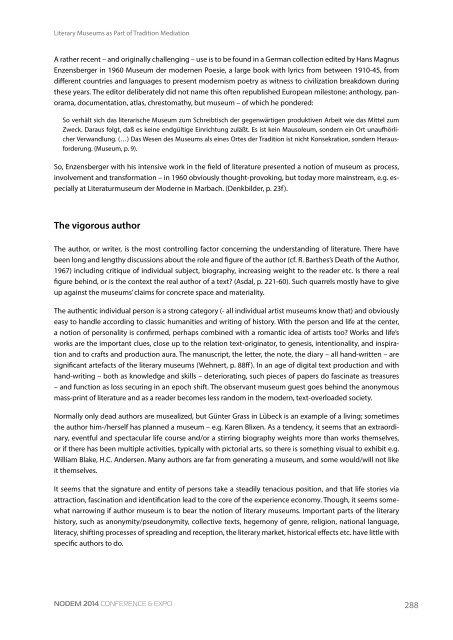NODEM 2014 Proceedings
NODEM 2014 Proceedings
NODEM 2014 Proceedings
You also want an ePaper? Increase the reach of your titles
YUMPU automatically turns print PDFs into web optimized ePapers that Google loves.
Literary Museums as Part of Tradition Mediation<br />
A rather recent – and originally challenging – use is to be found in a German collection edited by Hans Magnus<br />
Enzensberger in 1960 Museum der modernen Poesie, a large book with lyrics from between 1910-45, from<br />
different countries and languages to present modernism poetry as witness to civilization breakdown during<br />
these years. The editor deliberately did not name this often republished European milestone: anthology, panorama,<br />
documentation, atlas, chrestomathy, but museum – of which he pondered:<br />
So verhält sich das literarische Museum zum Schreibtisch der gegenwärtigen produktiven Arbeit wie das Mittel zum<br />
Zweck. Daraus folgt, daß es keine endgültige Einrichtung zuläßt. Es ist kein Mausoleum, sondern ein Ort unaufhörlicher<br />
Verwandlung. (…) Das Wesen des Museums als eines Ortes der Tradition ist nicht Konsekration, sondern Herausforderung.<br />
(Museum, p. 9).<br />
So, Enzensberger with his intensive work in the field of literature presented a notion of museum as process,<br />
involvement and transformation – in 1960 obviously thought-provoking, but today more mainstream, e.g. especially<br />
at Literaturmuseum der Moderne in Marbach. (Denkbilder, p. 23f).<br />
The vigorous author<br />
The author, or writer, is the most controlling factor concerning the understanding of literature. There have<br />
been long and lengthy discussions about the role and figure of the author (cf. R. Barthes’s Death of the Author,<br />
1967) including critique of individual subject, biography, increasing weight to the reader etc. Is there a real<br />
figure behind, or is the context the real author of a text? (Asdal, p. 221-60). Such quarrels mostly have to give<br />
up against the museums’ claims for concrete space and materiality.<br />
The authentic individual person is a strong category (- all individual artist museums know that) and obviously<br />
easy to handle according to classic humanities and writing of history. With the person and life at the center,<br />
a notion of personality is confirmed, perhaps combined with a romantic idea of artists too? Works and life’s<br />
works are the important clues, close up to the relation text-originator, to genesis, intentionality, and inspiration<br />
and to crafts and production aura. The manuscript, the letter, the note, the diary – all hand-written – are<br />
significant artefacts of the literary museums (Wehnert, p. 88ff). In an age of digital text production and with<br />
hand-writing – both as knowledge and skills – deteriorating, such pieces of papers do fascinate as treasures<br />
– and function as loss securing in an epoch shift. The observant museum guest goes behind the anonymous<br />
mass-print of literature and as a reader becomes less random in the modern, text-overloaded society.<br />
Normally only dead authors are musealized, but Günter Grass in Lübeck is an example of a living; sometimes<br />
the author him-/herself has planned a museum – e.g. Karen Blixen. As a tendency, it seems that an extraordinary,<br />
eventful and spectacular life course and/or a stirring biography weights more than works themselves,<br />
or if there has been multiple activities, typically with pictorial arts, so there is something visual to exhibit e.g.<br />
William Blake, H.C. Andersen. Many authors are far from generating a museum, and some would/will not like<br />
it themselves.<br />
It seems that the signature and entity of persons take a steadily tenacious position, and that life stories via<br />
attraction, fascination and identification lead to the core of the experience economy. Though, it seems somewhat<br />
narrowing if author museum is to bear the notion of literary museums. Important parts of the literary<br />
history, such as anonymity/pseudonymity, collective texts, hegemony of genre, religion, national language,<br />
literacy, shifting processes of spreading and reception, the literary market, historical effects etc. have little with<br />
specific authors to do.<br />
<strong>NODEM</strong> <strong>2014</strong> Conference & Expo<br />
288


